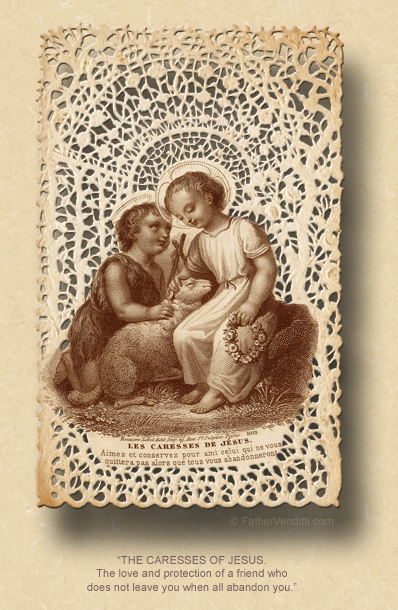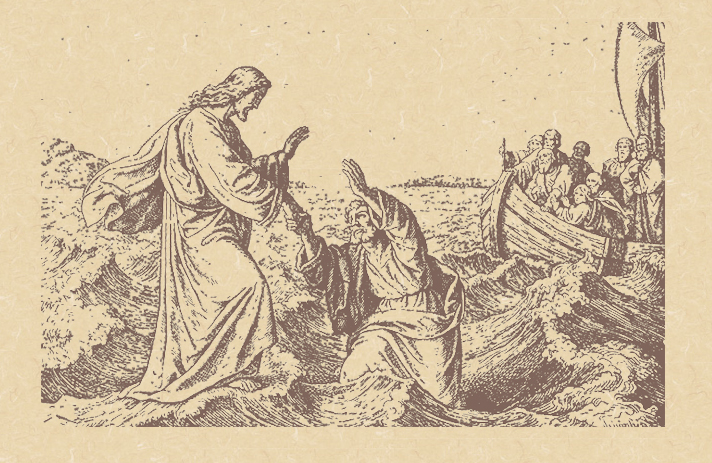The Only Thing We Have to Fear is…
The Twelfth Sunday of Ordinary Time.
Lessons from the primary dominica, according to the ordinary form of the Roman Rite:
• Jeremiah 20: 10-13.
• Psalm 69: 8-10, 14, 17, 33-35.
• Romans 5: 12-15.
• Matthew 10: 26-33.
The Third Sunday after Pentecost.
Lessons from the dominica, according to the extraordinary form of the Roman Rite:
• I Peter 5: 6-11.
• Psalm 54, 23, 17, 19.
• Luke 15: 1-10.
The Third Sunday after Pentecost; a Postfestive Day of the Nativity of the Baptist; and, the Feast of the Holy Venerable Martyr Febronia.
Lessons from the pentecostarion, according to the Ruthenian recension of the Byzantine Rite:
• Romans 5: 1-10.
• Matthew 6: 22-34.
FatherVenditti.com
|
8:20 AM 6/25/2017 — I will not ask you if you’ve read the Letters to Fortunatus by Saint Cyprian of Carthage, since I’m certain each of you has such a familiar and much-loved book by your bedside; and so, I know you’ll immediately recognize this gem from his commentary on today’s second lesson from Romans:
[W]ho would not make the effort to achieve such great glory, to become a friend of God, to possess Christ immediately, to receive the divine rewards after the anguish and torments of the earth? If for the soldiers of this world it is glorious to return home after humbling the enemy, how much more glorious and praiseworthy will it be to return in triumph to heaven once the devil is overcome… (Letter to Fortunatus, 13).
 It’s the perfect introduction to the Scripture lessons of today’s Mass, which are all focused on the subject of fear, or, conversely, the lack of fear which is courage. It’s the perfect introduction to the Scripture lessons of today’s Mass, which are all focused on the subject of fear, or, conversely, the lack of fear which is courage.
We all know someone—perhaps more than one—who is tormented and overwhelmed by the hardships that life brings with it. We may actually be such a person ourselves, at times. The adverse circumstances and obstacles that fate throws our way seem only to grow so long as we rely on our own efforts and on purely human resources. We also know people—and, again, perhaps they are us, too, from time to time—who seem to be ashamed of speaking clearly about God, or saying “no” to falsehood and openly showing themselves to be faithful disciples of Our Blessed Lord. They are afraid of what people will say, of going against the current or of drawing attention to themselves.
Our Lord’s opening salvo, then, in today’s Gospel lesson is directed at both such people: “Fear no one. Nothing is concealed that will not be revealed, nor secret that will not be known. What I say to you in the darkness, speak in the light; what you hear whispered, proclaim on the housetops” (Matt. 10: 26-27 RM3). He speaks it to those overwhelmed with the hardships of life to let them know that this life is but a temporary waystation on the journey, and that every obstacle can be overcome by grace. He speaks it to those who cower in fear from proclaiming the truth to let them know that He is always by their side.
There are, of course, times when we will choose to keep silent for reasons of prudence or charity, such as the parents who want to correct their adult children for casting off the faith in which they were raised, because raising the argument only results in anger, entrenching them further in their rejection.  But there’s a difference between that and keeping silent out of fear or cowardice. The Christian is never a friend of darkness and hidden corners. Christ calls us to be friends of the light, of openness in our lives and in our words. But there’s a difference between that and keeping silent out of fear or cowardice. The Christian is never a friend of darkness and hidden corners. Christ calls us to be friends of the light, of openness in our lives and in our words.
The times we live in are such that we need to proclaim the truth clearly. Falsehood and confusion are leading many astray. It seems absurd, but at times even good doctrine, the moral norms of behavior, following the Gospel in our work and in the demands of married life, even common sense itself, are held in less esteem than some scandalous, erroneous doctrine which is held to be “advanced” or tinged with a progressive hue. To live bravely, with holy daring, in a world which is frequently unable to understand anything except purely material values … that is the challenge our Lord throws before us. “I hear the whisperings of many,” says the Prophet Jeremiah in our first lesson, “‘Terror on every side! Denounce! let us denounce him!’ All those who were my friends are on the watch for any misstep of mine. ‘Perhaps he will be trapped’ [they say]; ‘then we can prevail, and take our vengeance on him.’ But the Lord is with me, like a mighty champion: my persecutors will stumble, they will not triumph” (20: 10-11 RM3).
Fearing neither life nor death, facing even serious difficulties joyfully, steadfastly confronting obstacles that demand effort and sacrifice, serenely enduring illness, remaining always calm in the face of an uncertain future … that’s how God wants us to live. It’s easy to say, of course, not so easy to do; but, it is possible with the help of grace, and if we remember each and every day that we are children of God, particularly in those moments when we are assailed by worry, anxiety and the darkness of uncertainty. “Are not sparrows sold two for a penny? And yet it is impossible for one of them to fall to the ground without your heavenly Father’s will. And as for you, he takes every hair of your head into his reckoning” (Matt. 10: 29-30 Knox). I’m thinking that might be difficult in my case, except for God.  Saint Jerome, being almost too simplistic, still feels compelled to remind us, commenting on the Gospel of today’s Mass, that “If the sparrows are so cheap and yet fall under the providence and care of God, how can you who are eternal by the nature of your souls be afraid that He whom you venerate as your Father will not take special care of you?” (Commentary on St. Matthew, 10: 29-31). A part of us wonders why he even wasted ink making such an obvious point, but perhaps because it’s such a crucial one; so crucial, in fact, that should one forget it, all of life becomes meaningless. That’s why the question appears at the very beginning of the Baltimore Catechism: “Why did God make you? God made me to know Him, to love Him, and to serve Him in this world, and to be happy with Him for ever in heaven.” It was placed right at the beginning of the Catechism because, if you don’t know that, then nothing else that follows will make any sense at all. Saint Jerome, being almost too simplistic, still feels compelled to remind us, commenting on the Gospel of today’s Mass, that “If the sparrows are so cheap and yet fall under the providence and care of God, how can you who are eternal by the nature of your souls be afraid that He whom you venerate as your Father will not take special care of you?” (Commentary on St. Matthew, 10: 29-31). A part of us wonders why he even wasted ink making such an obvious point, but perhaps because it’s such a crucial one; so crucial, in fact, that should one forget it, all of life becomes meaningless. That’s why the question appears at the very beginning of the Baltimore Catechism: “Why did God make you? God made me to know Him, to love Him, and to serve Him in this world, and to be happy with Him for ever in heaven.” It was placed right at the beginning of the Catechism because, if you don’t know that, then nothing else that follows will make any sense at all.
That’s really the irony of the whole problem: we suffer so much anxiety and fear because we allow it to blind us to the destination that comes at the end of the journey. Or, as I’ve said so many times,—I think this will be the fourth time this summer I’ve used this line—our one purpose for being on this earth is to work out our salvation. Everything else is just window-dressing. In other words, with everything that causes us anxiety and fear, the only thing we really should fear is sin, which destroys our friendship with the God who made us and leads to eternal damnation.
The Dogma of Sufficient Grace is clear: God never allows a trial to come our way without providing the grace necessary to endure it. But, as I’ve also said before, it’s the Dogma of Sufficient Grace, not the dogma of abundant grace. God made us with a free will, and we still must do our part. Saint Paul once told us, “…a thorn in the flesh was given to me, an angel of Satan, to beat me, to keep me from being too elated. Three times I begged the Lord about this, that it might leave me, but he said to me, “My grace is sufficient for you, for power is made perfect in weakness” (II Cor. 12: 7-9 NABRE). And He who helped Saint Paul will take care of us.
Praying the Psalms has, unfortunately, fallen out of fashion among lay people. Priest do it every day because they’re required to. But the Psalm of today’s Mass is directed spot on to all those who struggle in this life:
For your sake I bear insult, and shame covers my face. I have become an outcast to my brothers, a stranger to my children, Because zeal for your house consumes me, and the insults of those who blaspheme you fall upon me … I pray to you, O Lord, for the time of your favor, O God! … For the Lord hears the poor, and his own who are in bonds he spurns not. Let the heavens and the earth praise him… (Psalm 69: 8-10, 14, 34-35 RM3).

|

